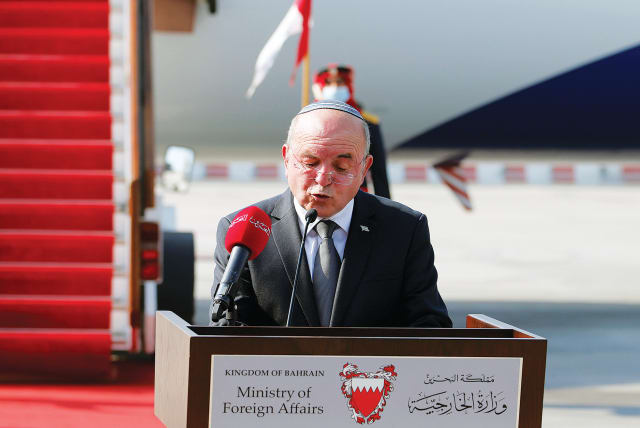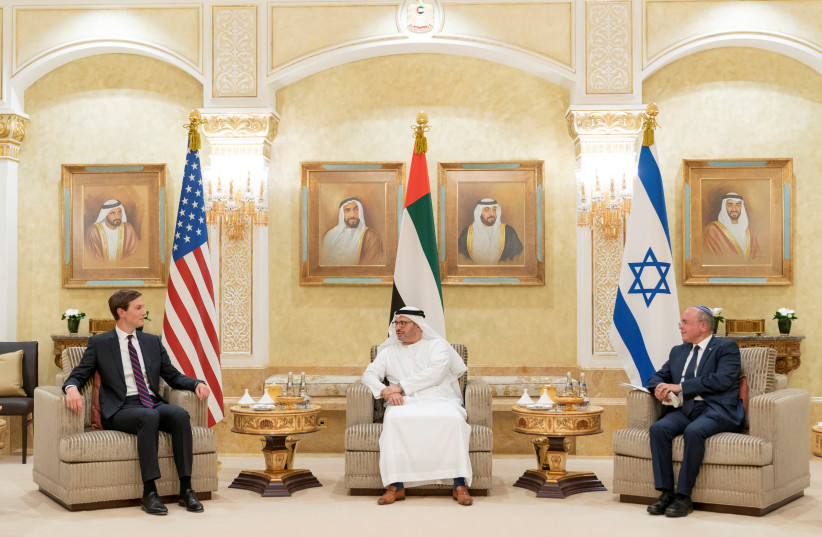Israel needs creative maneuvering to ensure regional security - opinion

Recent developments raise questions about an Israeli grand strategy - clearheaded thinking and devotion to Zionist and Jewish goals are needed.
The tentative Saudi reconciliation with Iran last week, brokered by China, sent some Israeli politicians into a tizzy. Opposition leader Yair Lapid, for example, was ridiculously quick to condemn Prime Minister Benjamin Netanyahu for the collapse of the Abraham Accords and any prospect of Saudi-Israeli and Saudi-US rapprochement.
Leaving aside such nonsense, the semi-surprising development does raise questions about a grand strategy, making creative Israeli maneuvering more necessary than ever.
I for one do not believe that the Saudi-Iran agreement closes the door on Saudi-Israeli entente, nor on a renewed pro-Western regional alliance involving Israel and the Saudis – if only Washington would wake up and buttress this with smart, concrete commitments.
Strategic thinking is needed
One thing is clear: Israel must play three – or four-dimensional diplomatic chess to secure its regional security. This requires clearheaded strategic thinking with unfailing devotion to Zionist and Jewish goals.
Entering this intellectual space is the new Institute for Zionist Strategy and National Security, Misgav, led by Meir Ben-Shabbat. (I am involved too.) Ben-Shabbat served as Israel’s national security adviser and head of the National Security Council between 2017 and 2021 – far longer than any NSC chief in recent decades – and for 25 years prior to that, he held senior positions in Israel’s General Security Service.

He is respected as an astute analyst, an effective security practitioner, a discrete diplomat and a man of principle.
Many readers will remember his magnificent diplomatic address in Rabat, Morocco, in December 2020, in fluent Darija, the Moroccan Arabic dialect. Ben-Shabbat, who hails from Casablanca, at the time led the Israeli delegation to Morocco alongside Jared Kushner and an American delegation, which resulted in the establishment of full relations between the two countries. The video of Ben-Shabbat’s stirring speech went viral in the Arab world.
On the agenda for the new think tank is a range of critical issues beginning with countering Iran in every way, investment of resources in growing the Abraham Accords, managing Israel’s diplomatic ties with China, Russia and Europe, reinforcing Israel’s sovereign control in Jerusalem, restoring Israeli governance in Area C of Judea and Samaria and in the Negev and Galilee, preparing for the day after Mahmoud Abbas in Palestinian-held areas, reforming the Israel Police and bolstering the IDF – particularly its ground forces – in preparation for a possible three-front war.
Major challenges for the Jewish world
FELLOWS OF the new institute also will focus on major challenges to global Jewish strength, including the high cost of Jewish education, aliyah impediments, problems in the Law of Return, woke culture and BDS assaults on the confidence of young Jews everywhere, deficits in the perception of Israel’s democratic and Jewish foundations, the integration of Israeli Arabs and ultra-Orthodox Jews in Israeli society, Zionist and Jewish civics education in Israel, and more.
Regarding Iran, Ben-Shabbat argues that the time has come for the West to change course and pose a credible threat to the regime of the ayatollahs and reduce the risk of actual war. Advancing a military option against Iran will not necessarily lead to war. Just the opposite is true, Ben-Shabbat asserts. Without such measures, the likelihood of a violent eruption in the Middle East will significantly increase.
Regarding Palestinians, Ben-Shabbat insists that Israel must act compellingly to prevent terrorism from snowballing any further. He says the threshold for conducting administrative detentions of terrorist supporters and those who praise terrorist attacks should be lowered.
As well, more rapid and effective IDF and police responses are required at the very moment an attack is perpetrated, leading to the neutralization of terrorist attackers to dissuade copycats.
Punishment for terrorism must be enhanced, as well. This includes destroying the houses of such perpetrators as a deterrent measure against future attacks (which is particularly effective in traditional Palestinian society where the family plays a key role), taking social benefits away from terrorists and terrorists’ family, and revoking the residency status of inciters from eastern Jerusalem and deporting them.
Israel must also act forthrightly against sources of incitement in schools in eastern Jerusalem, in the media and social media, and in sermons voiced in mosques.
Overall, there is, in fact, a successful Israeli grand security strategy of sorts and it must be pursued with determination. It involves steadfastness, patience and looking over the horizon for new partners while fearlessly confronting bad actors. It involves being both flexible and firm.
It means strictly securing Israel’s borders, managing frictions with the Palestinians and pursuing Zionist goals like continuing the settlement of Israel. It involves positioning Israel as a regional anchor of sanity and a global source of ingenuity.
In the face of Iranian hegemonic ambition, Russian adventurism, Chinese expansionism, American retrenchment and Palestinian rejectionism, Israel stands tenaciously firm with the strongest military ever assembled in the Middle East and a still-believing people.
Vigilance and diplomatic nimbleness will see Israel well through the regional and global storms. The Institute for Zionist Strategy and National Security will contribute concrete policy proposals to keep Israel’s leaders focused.
The writer is a senior fellow at the Institute for Zionist Strategy and National Security (Misgav) and at Israel’s Defense and Security Forum (Habithonistim). The views expressed here are his own. His diplomatic, defense, political and Jewish world columns over the past 26 years are archived at davidmweinberg.com.
